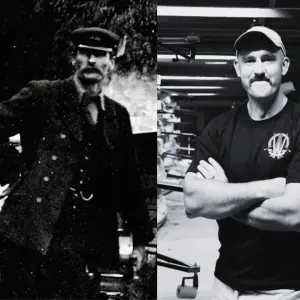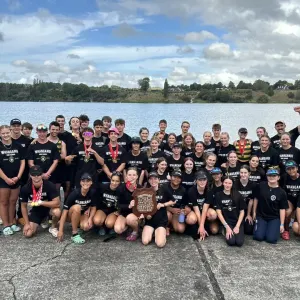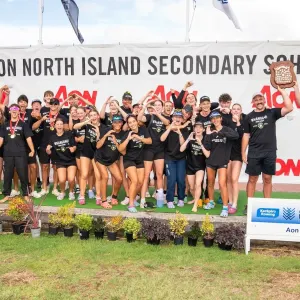Whanganui High School Sports

How Axel woke a sleeping giant
Andy Hay catches up with the former New Zealand athlete who’s re-ignited Whanganui’s rowing scene. It cracks Axel Dickinson up to look at his life now and think about his great, great grandfather Kenny Stuart. The GGG was captain of the Whanganui paddle steamer Wairere going back more than 100 years ago. The moustache is an obvious similarity. Their occupation is too. “There's a photo in the museum,” says Axel. “I just found it hilarious that he probably spent his life going up and down the [Whanganui] river on a boat. And here I am doing the same thing.”
Axel’s beginning his third year as director of Aramoho-Whanganui Rowing Club, and like his great, great grandfather appears to have the waters of the river running in the veins straight to his heart.
“There's no debate as to where the best water is,” says Axel. “It's the most reliable water in the country on a day-to-day basis. The winter's exceptional, we've just had a little bit of a flood now, but that was the first one of the winter, you just wake up every day, pop down to the club and it's just glass, it's unbelievable.”
Aramoho-Whanganui has been one of the standout performers in the past couple of seasons, a regional club getting great results at New Zealand Championships and, through its schools programme (fuelled mainly by athletes from Whanganui High School), top results at Aon Maadi as well.
Axel, who grew up shuttling between Petone and Taranaki, thinks part of that comes down to the intrinsic simplicity rowing in the regions offers.
“It's a bit of a throwback...it reminds me of my childhood,” he says.
“I think there's a lot to be said for kids from smaller cities and towns who once they've finished school, jump on their bike or scooter or whatever, and make their way down to training and the water's right there.
“There's not so many other distractions or barriers. The kids just really get amongst it and rowing becomes a big part of their lives.”
He’s worked hard to eliminate as many barriers to participation as possible, another throwback to his youth.
“I remember when I rocked up to Petone Rowing Club as a young fella, the subs were about 150 bucks a year. That's showing my age, everyone's going to be like, ‘Did you pay in shillings or something?’”
As well as keeping fees down, he made the training environment more flexible to accommodate the socio-economic realities in a post-Covid world.
“Whanganui High School at the end of the day is a decile 4 school, probably half the kids at the school wouldn't be able to afford to row if they wanted to, and even for the families that can row, it can be a real struggle.”
Many of the kids had part time jobs or second sports in the summer, so Axel reduced the 10 sessions a week to five or six, and they became optional as well.
“If you weren’t there on any particular day, no one was going to be on your back about it, so you could have your part-time job and do your thing with the intention that the increased numbers would drive competition and incentivise the training.” with the intention that the
That commitment to removing barriers extends into racing as well.
“If there's a regatta [and] the money's tight and you can't make it to, don't worry, it's not going to impact your selection.”
When Axel took over, there were 20 active rowers in the club. There hadn’t been a medal at nationals for a number of years.
But the change to the programme helped boost membership and expectations.
“The club always felt like a bit of a sleeping giant,” says Axel. “When you've got a lot of numbers and you make it competitive, I kind of said ‘You might have a bit of success here’.
“We ended up being much more successful than would have originally thought going in. We were like 11th overall at 2023 Nationals and sixth in 2024. The club hadn't even gone to the previous nationals.”
The Rowing NZ AGM for 23-24, Aramoho-Whanganui was also named club of the year. That’s an accolade for the whole club to enjoy and take credit for, says Axel.
“It’s really down to the overall community regarding all the work of our volunteers, from committee, coaches, masters and parent helpers, that pour heaps into it. At the end of the day, I’m the connecting piece for a foundation of passionate, knowledgeable people that were already long involved in the club.” Some of those long-time members are regulars at the club’s fortnightly Whinge and W(h)ine Wednesday.
The re-emergence of Whanganui High School has also been impressive. At this year’s Aon Maadi Regatta, Whanganui High made 14 A Finals, won eight medals and finished fourth equal in overall points.
“I really want to see Whanganui High become the top school in the country for rowing,” says Axel. “I think it’s a fantastic goal to have but especially for a decile four public school. If we can pull this off, that's a great signal for our sport.”
And this year Aramoho-Whanganui will become one of Rowing New Zealand’s designated summer development hubs.
“I think from Rowing Zealand's point of view, they can see that we're producing some really fast rowers and they want to facilitate us to continue to do so,” says Axel. It fits in with his vision for Whanganui as a unique rowing centre of excellence.
“Whanganui gets kind of boxed in a little bit without having a university or a lot of white-collar history. But [we’re] certainly trying to build enough of a groundswell that there is that pathway for kids to be able to stay in the region.”
A chance encounter at Maadi Regatta also showed that working-class roots can build deep connections. “I sat down at this table and there's this fella at the other end. We hit it off and were yarning away for ages about the club and where it's come from and what we're doing. At the end, he’s like, ‘You know, I've really enjoyed this conversation, give me your phone number and I'll wire the club some money.’”
Axel had just met David Williams, a House of Travel owner in Christchurch whose daughter coxed at Rangi Ruru. David, like Axel, comes from a working-class background and while he’d never been to Whanganui or really knew the place, he signed on to a generous three-year sponsorship of the club.
It’s just another reason why Axel believes he is in the right place, on this quiet piece of water he calls paradise.
“When this job popped up it just felt like a match made in heaven. I went over for a visit and they rolled out the red carpet and made my wife and I feel really welcome.”
And the constant appearance of the Wairere’s sister ship Waimarie, only reminds Axel, he, like his great, great grandfather, are at their best when they’re paddling up and down the mighty Whanganui River.
18/9/24



